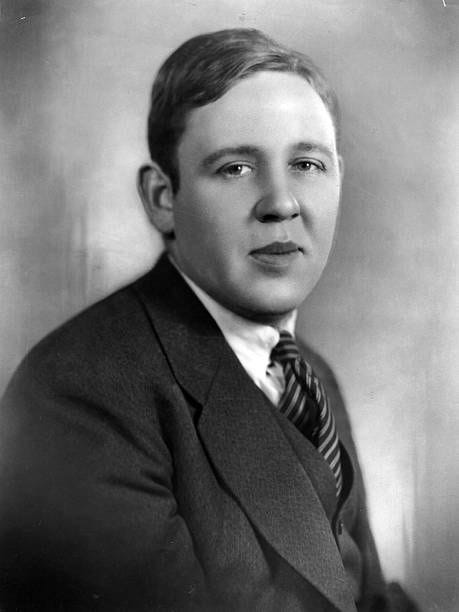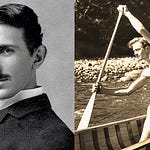In my need for fantasy in these desolate times, I've been playing with AI video generators to bring vintage photos to life.
Most of the experiments—some in the compilation above—have been eye-opening, to say the least. There’s something thrilling about seeing static images blink, come alive, and even make out.
It’s a kind of time travel, a digital séance, a surreal blend of science and spirit.
Of course, not everything goes smoothly. Limbs occasionally appear and disappear. Smiles stretch a little too wide. Eyes dart suspiciously like they’ve seen the code behind the curtain. The uncanny valley is real—and sometimes it’s more of a cliff than a valley.
Still, what I find most exciting about using AI in this way isn’t the polish—it’s the possibility. These aren’t perfect recreations. They’re experiments. They’re dreams rendered through math and machine. They ask what could have been or what might still be imagined.
But here's the thing: AI isn’t neutral. It doesn’t come to the table without baggage. It reflects the datasets it’s trained on—which often means it amplifies existing beauty standards, biases, and blind spots. So while I’m fascinated by what these tools can do, I also recognize their limitations—and their risks.
And let’s be real: not everyone is using AI to make art. Bad actors are already weaponizing AI video to spread disinformation, impersonate public figures, and commit crimes. Deepfakes are being used to manipulate elections, fake evidence, and exploit individuals—especially women and marginalized people.
The same tools that can resurrect memories can also rewrite reality in dangerous ways. That’s not a distant threat—it’s already happening. Pandora is out of her box.
That’s why I approach this work with both caution and creativity. Caution, because I don’t want to romanticize the tech or ignore its ethical implications. Creativity, because I believe in using new tools to tell old stories in fresh, possibly healing ways.
This is just the beginning of my AI journey. More experiments—and questions—are on the way. If you’re into curious reimaginings, occasional digital weirdness, and thinking deeply about where technology meets memory, you might enjoy what comes next.
Stay tuned. And stay critical.
Clint 🌈✌️
COLLIDE PRESS is a reader-supported publication.
Please consider becoming a paid subscriber or patron.
Big thanks to all who’ve subscribed and/or supported!
FOR YOUR (SUBSTACK) CONSIDERATION
Why Good Men Love Open Relationships (Dear Black Gay Men’s Substack)
Probably This Week: A River, A Mustache, And A Core Memory! (Not So Fast)
ON THIS DAY = JULY 2
BIRTHDAYS
1869 = Liane de Pougy = French dancer and courtesan 🌈
1899 = Charles Laughton = British-American actor 🌈
1900 = Sophie Harris = English costume and scenic designer
1904 = René Lacoste = French tennis player, businessman, and polo shirt creator
1906 = Bruce Nugent = American writer and painter 🌈
1908 = Thurgood Marshall = American lawyer, activist, and jurist
1916 = Ken Curtis = American actor and singer
1922 = Pierre Cardin = Italian-French fashion designer 🌈
1925 = Medgar Evers = American soldier and activist
1927 = Brock Peters = American actor
1932 = Dave Thomas = American businessman and Wendy's founder
1937 = Polly Holliday = American actor
1939 = Paul Williams = American singer and choreographer
1941 = William Guest = American singer-songwriter and producer
1946 = Ron Silver = American actor, director, and political activist
1947 = Larry David = American actor, comedian, producer, and screenwriter
1951 = Sylvia Rivera = American activist 🌈
1956 = Jerry Hall = American model and actor
1975 = Daniel Kowalski = Australian freestyle swimmer 🌈
1983 = Michelle Branch = American singer-songwriter
1984 = Johnny Weir = American figure skater and tv personality 🌈
1990 = Margot Robbie = Australian actor and producer
EVENTS
1698 = Thomas Savery patents the first steam engine.
1723 = Bach's Magnificat is first performed.
1897 = British-Italian engineer Guglielmo Marconi obtains a patent for radio.
1900 = Jean Sibelius' Finlandia receives its première performance in Helsinki.
1928 = The Jenkins Television Corporation (owned by Charles Francis Jenkins) goes on air with W3XK, the first television broadcasting station in the US.
1962 = The first Walmart store, then known as Wal-Mart, opens for business in Rogers, Arkansas.
1964 = POTUS Lyndon B. Johnson signs the Civil Rights Act of 1964, which prohibits segregation in public places.
1980 = Airplane! is released in theaters.
1991 = Boyz N The Hood premieres in LA.
HOLIDAY + OBSERVANCE
PORTRAIT + QUOTES OF THE DAY
“Hollywood is a goofy place. But I like it. It's the perfect mummers' home. If one weren't a little mad one wouldn't be there.”
Charles Laughton
“They can't censor the gleam in my eye.”
Charles Laughton



















What a great intro to this post! I do hate that we are almost there to the point where we won't be able to tell real from artificial. Talk about 1984. Wow!
Thanks, David…we are definitely on the precipice of the real vs. ai divide. I kind of love it, but also have to remind myself to look beyond just the way things look now. The tools open up some creative opportunities, but also open several cans of worms. :-p
Clint dear,
I lived in West Hollywood in the '90s. One afternoon, my former partner and I passed by Mr. Peters walking on Sunset Blvd. We all smiled. Soon after, I mentioned seeing him and a friend responded that a fellow he knew had slept with the actor. In other words, who knows how reliable a "source" that person was.
Cheers and hugs,
Fred
I don’t doubt it, Fred. I have several similar stories. My personal rule is I don’t “report” it unless I can find some published reports. :-p
We don't teach critical thinking and epistemology (Theory of knowledge, how do I know what is true and how do I trust the source of that). Too many people will be fooled by a fantasy or by unethical people.
Men kissing men? Yeah, I believe in that. Kiss, kiss, kiss. Where are the sensory skin suits? Then I can live in a wank wonderworld.
Wank Wonderworld? Count me in…you know how much I adore adult alliteration. :-p
Clint, I thought you made the perfect description of the good, even wonderful, potential of AI when you said “they ask what ‘could have been’ or what ‘might still be’ imagined. That is a wonderful description of what AI may make possible. AI also has enormous potential for unimaginably bad outcomes. Today’s LA Times had a front page article about how China is using AI to redo many Kung Fu movies without consideration of whether the original producers, artists or creators care or have even been consulted. The Chinese government doesn’t care. Unfortunately, we know that a certain element of our current administration doesn’t care either. I have a good friend who is amazed at what AI is capable of. He sees the good it can do for him, and is terrified of its potential. How we as human society, whether our own government or the world at large deal with AI will drive the future of humanity. Change is inevitable, often resulting in unintended consequences. AI is out of the box, what we do with it is in our hands. What will the future hold.
Thanks, Walt. I’m sure some of my subjects wouldn’t approve of my reimagining their images, but I try to be respectful…and sweet about it. Just trying to use the tools for good not evil. The lines can easily get blurry though, depending on your pov…or the time of day. :-p
I liked your AIs Clint , the rest were more like Artificial Stupidity. We already have enough real stupidity. People might think this is something new, but it isn't. This is just the latest method to attempt to replace having to pay people for their work. 🎹🌈🏳🌈🖤🤎💚🧡
I don’t disagree, Steve. Though the courts so far aren’t on the side of creators. So I’m doing my best to use the tools for fun stuff (and being very clear when AI is being used). What a messy tool, but a sometimes magical one. The rest of the time it’s tedious and tiresome. lol
My favorite part of your AI was the guy at the end just bouncing up and down, but I would be very happy if you could get Montgomery Clift to kiss Joe Dallesandro.
💋💕😍💚🧡💛💙💜❤🖤🤎
I might be able to make that happen. Lemme noodle on it a bit. Where there’s a will there’s a way! :-)
Rainbow Patrol, reporting for duty, sir. Please add one to Brock Peters. Many thanks!
Fred, do you happen to have a source for this rainbow? All my sources say he was married to one woman and dated many others. But he did play gay once. At least. Happy to find out more about this talented actor.
Thank you, kind sir. It seems as though we often agree.
Thank YOU, kind sir. I’m glad we agree on most things. And the rest? We can simply agree to disagree without all the disagreeable stuff. Cheers, Fred!
Wow! I'm not sure if I'm supposed to feel excited or disturbed by this! I love the creativity but I also see the dangers of rewriting history with AI. I also wonder about the legalities. I wonder what would happen if we let Tom Cruise and Brad Pitt kiss in Interview with the Vampire! I'm curious: which AI platform did you use to create this?
Yeah, it's a bit of the Wild WIld West. Which isn't necessarily a bad thing, but something to be aware of in my book. I'm using an mobile app called PhotoRevive AI. I recommend checking it out on the App Store or Google Play. Cheers!
Clint as you say AI proceed with caution. When's it's obvious AI at least you know it's fake. It's the serious AI fakers you need to stay clear of. Even lead to conflicts because some AI president/leader tells you to do it, that's the real danger, malicious intent. Don't get me started Clint ggggrrrrr, Cheers DougT 🇫🇴🇬🇧
Agreed. I’m using it as a tool to “reimagine” the past (that’s a lot gayer and more fun) but definitely going to point out it’s AI…and leave it to the viewer to decide if it’s fun for them. Cheers!
Very sensible. It's the malicious deep faker users that will spoil the 'better' aspects of AI use. The thing is the younger generations are being seduced into thinking AI is now the normal.....,.. IT'S NOT. At some levels younger generations don't want a true education as AI/Google will make the decisions for them, do their schoolwork etc. Imagine if your in the ER and a younger medic says AI/Google will tell me what to do. As I said don't get me started. However as the guy says he wants AI to enhance his freeform naturist/nudist art then that's ok to me.
Thanks for the update on AI Clint. I'm curious as to what program you are experimenting with. I keep looking for a AI program that will do nude art to accompany my post on naturism but haven't found good resources yet but I know there are several out there. The technology is changing rapidly and it will at least be interesting to see how it all shakes out.
Hi jparr! I’m using PhotoRevive AI (on iOS), though whenever I’ve tried anything with nudity there’s always a “server error,” but it has occasionally made a mistake. I’m not sure how some of the deepfake corn accounts do it, but if there’s a will, there’s gotta be many ways. Cheers!